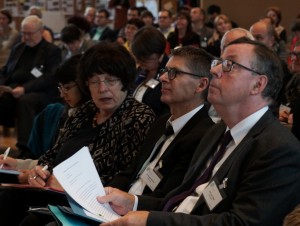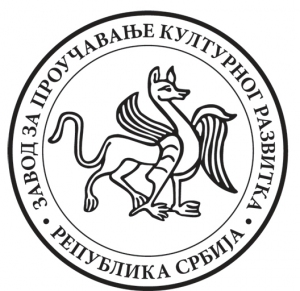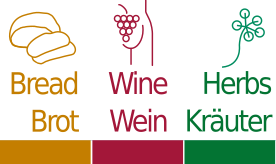We want to present you the topics of the “Danube-Networkers for Europe (DANET) e.V.” Newsletter.
Newsletter 4 (April 2016)
1. Background Article
1.1 Doubts about new methods of learning at an older age (learning in later life)
Tihomir Žiljak,Public Open University Zagreb
Improvement of the teaching method is a continuous process throughout the educational system. However something that might seem like new has actually been used 30 or 40 years. Experience of the Public Open University in Zagreb has shown that some methods of cross-curricular teaching and active participation of students were used 70 years ago in the music compendia or early 1960s in courses on contemporary art. Innovative characteristics of the building of Public Open University Zagreb itself were important. In 1960s it was designed as a space where there are no conventional classrooms and classical teaching; and round tables, blended learning, etc., classrooms connected to the cabinets have been used. Already then it was clear that the new methods cannot be implemented without a new design of space and equipment. For this purpose furniture for adult students who are actively involved in teaching was designed. Arrangement of premises was in accordance with continuous communication between teachers and students. Unfortunately, sometimes we are doomed to discover again what we have already applied.
1.2 Public lectures “Zrno mudrosti” U3A Zagreb
Prof. Jasna Čurin,
Head of the U3A Zagreb, Croatia
Within the U3A Zagreb for the last several years we have public lectures “Zrno mudrosti” or in English “The grain of wisdom”. It’s a series of lectures given by our students to their fellow students and other members of public. The goal of these lectures is to show that professional retirement shouldn’t mean intellectual retirement. This is the reason why we want our students to share their rich professional and life experience with others. Topics of the lectures vary and they go from health, psychological, ecological, philosophical, musical and political topics to the most popular one and those are travel stories. Lectures are given once a month during the school year and we have a very high attendance rate. The idea for these types of lectures came from the fact that most of our students are highly educated and are of different professions and we wanted to stimulate them and make them play a more active role in the creation of the U3A programme. This attitude is part of the U3A concept because we feel that prejudice concerning older people is still very much present in the Croatian society. Also it is our belief that possibilities and wishes of the third age generation for the life long learning is not taken seriously enough. They don’t want to nor they should be passive listeners when they can do so much more!
2. National and International Policy
2.1 Short Report of the 2nd Participation Day in Ulm, Germany, 28th of October 2015
Carmen Stadelhofer, Akad. Dir’in a.D.
Coordinator of the 2nd Participation Day,
President of Danube-Networkers for Europe (DANET) e.V. and of ILEU e.V.

On the 29th/30th of October 2015, the 4th Annual Forum of the EU Strategy for the Danube Region (EUSDR) took place in Ulm, Germany. Following the example of the conference 2014, a 2nd Participation Day for civil society actors was scheduled prior to the main conference on the 28 of October, in Ulm as well.
The 2nd Participation Day 2015 aimed to contribute to a stronger involvement of civil society and local actors of the 14 EUSDR countries in the implementation of the EUSDR. It provided a platform for debate, opinion building, exchange and cooperation for the representatives from civil society organizations and local actors in the Danube Region.
Moderation: Jörg Mirtl, Coordination of the Danube Local Actors Platform (D-LAP)
2.2 Danube Civil Society Forum – History and Perspectives
The Danube Civil Society Forum (DCSF) was founded on 1 July 2011 at the first general conference with more than 100 participants. It is open to civil society active in non-profit and non-partisan organisations as well as academics (one representative per NGO) from the Danube Region (Germany, Austria, Hungary, Czech Republic, Slovak Republic, Slovenia, Romania, Bulgaria and Croatia, Serbia, Bosnia and Herzegovina, Montenegro, Ukraine and Moldova). The DCSF is the platform for civil society dialogue and networking in the Danube basin under the EU Strategy for the Danube Region (EUSDR). It functions as the interface for structured consultations between civil society and public and private authorities on the regional, national and EU level as well as to international and intergovernmental organisations active in the region. While the DCSF acted in close cooperation and in consensus with the responsible EU institutions, the Danube Civil Society Forum is a self-organized and independent NGO structure. The Forum is registered under the Austrian law. The objectives of the Danube Civil Society Forum are: To support and promote the Danube Strategy following the principles of respect for democracy and human rights, the rule of law, good governance, principles of market economy and social and environmental sustainable development; To support the existing non-governmental organizations, the creation of independent and autonomous non-governmental organizations, to strengthen the capacity of civil society and to support, assist and coordinate the efforts of its members; To promote a culture of dialogue and cooperation between civil society organizations and between civil society and public and private actors in the Danube Basin; To promote dialogue and solidarity between peoples and cultures.
2.3. Report from the Meeting of the Working Group 3 of DCSF in Ulm the 27th of October 2015
Building Prosperity in the Danube Region
Author: Ana Zlibut, Timisoara, Romania
The Working Group 3 was formed by members from Germany (Carmen Stadelhofer, Markus Marquard), Slovenia (Dusana Findeisen, Tamara Jare), Ukraina (Lesya Loyko, Oleh Luksha, Olha Yehorova, Alla Kozhyna), Bulgaria ( Mariela Nankova, Emiliya Velikova), Serbia (Marina Fodor) and Romania (Ana Zlibut).
2.4. Danube Local Actors Platform Advisory Committee
Author: Carmen Shadelhofer, Ulm, Germany
The 3rd meeting of the Danube Local Actors Platform Advisory Committee was organized and hosted by PA 10 in Vienna 9. December 2015. 18 members of the D-LAP took part at the meeting.
Reports were hold on the the 4th. Annual Forum and the 2. Participation Day in Ulm as well as on National Hearings and its follow-up developements. Outlook on the 3. Participation Day, Bratislava October 2016 was discussed and the implementation of the PA 10 small project fund- creation of small project funds and micro-credit schemes in the Danube Region was introduced.
2.5 Meeting in Sofia, Bulgaria, 17th and 18th of March 2016:
“Citizen Participation National Meeting”
Author: Carmen Shadelhofer, Ulm, Germany
Abstract: The General Assembly of Citizen Participation Forum invited the 17th – 18th March, 2016 to a Conference for the Bulgarian Network for Citizen Participation as well as a DCSF Executive Committee Meeting had been on the 16th of May.
3. Danube-Networkers Presents Itself
3.1 The History and the Activities of the Centre for Adult Education in Bulgaria
Assoc. Prof. Emiliya Veikova, PhD
Centre for Adult Education, University of Ruse, Bulgaria
Abstract: The paper presents the Centre for Adult Education of the University of Ruse, Bulgaria
During one of her visits to Bulgaria in 2010, under the Danube Strategy, Mrs. Carmen Stadelhofer, the President of ZAWiW, Centre for General Scientific Education of the University of Ulm, Germany, met Mr. Yordan Kazakov, the President of the Union of Pensioners’2004, branch Ruse, and Prof. Nikolay MIhailov, Vice Rector of the University of Ruse. They outlined a program for developing joint European projects for education of elderly people from the Danube region. Despite the great number of the members of the Union of Pensioners, more than 7000, and many local clubs, more than 80, in the Ruse region, there didn’t exist a centre or a university for third age education. Such kind of centres and a European project for third age didn’t exist in Bulgaria at that time.
3.2 Centre for Study in Cultural Development Republic of Serbia
About us

Centre for Study in Cultural Development was established by the Assembly of the Republic of Serbia by the Law on the Establishment of the Centre for Study in Cultural Development in 1967. It was founded due to the necessity of planning and implementing cultural policies professionally, efficiently and effectively, and of developing scientific thinking of culture in Serbia. The Centre is the only institution in Serbia which deals exclusively with research in the field of culture and is the core of the Ministry of Culture and Information.
The role of the Institute reflects in the study of social phenomena and cultural changes, as well as finding opportunities and models of using modern methods of operation and improvement of cultural activities. In addition to the crucial link with the Ministry of Culture and Information, which supports and influences the activity of the Centre with its needs, the work of the Centre includes the permanent collaboration with all participants in culture: state institutions, non-governmental organizations, associations and experts in culture.
4. Examples of Good Practice to Review
4.1 The Project Tastes of Danube – the First Bake Eevent in Ulm, Germany
 Carmen Stadelhofer, Akad. Dir’in a.D.
Carmen Stadelhofer, Akad. Dir’in a.D.
President of ILEU e.V. and Danube-Networkers for Europe (DANET) e.V.
Marina Iser, Ulm, Germany
In January 2016, the Danube-Networkers of Ulm officially launched the new project “Tastes of Danube. Bread. Wine. Herbs” after a pilot phase which ran from October to December 2015. Until the present day civil society institutions, universities, colleges, and schools from 11 different countries in the Danube Region had been included as project partners. The project is partly sponsored by the State Ministry of Baden-Württemberg and the Baden-Württemberg Stiftung. The project is designed to run for a year, with the option of prolongation.
4.2 Danubian Bread and Flowers
Nowadays it is very important to bring people together, and we can make a step with our writings and poems, building bridges of culture between people in the Danube region.
4.4 The project Tastes of Danube in Serbia
Lidija Jevremovic
In beginning of project we had tree project presentations and discussions with potential partners.
MEETING IN THE “INSTITUTE FOR THE STUDY OF CULTURAL DEVELOPMENT“ IN BELGRADE ON OCTOBER 16TH 2015
Meeting in the “Institute for the Study of Cultural Development“ in Belgrade on October 16th 2015 on worlds food and bread day for initiating the new project “Tastes of Danube”
5. Publications and Interesting Links
6. News from Danube Networkers
7. Event Calendar
22nd -24th of April 2016
Beograd, Serbia
Board Meeting of DANET e.V.
12th -13th May 2016
City Hall Reims, France
International Conference “History and Development of the U3A in the world”
Aoosiation Internationale des Universités du 3ième age (AIUTA)/International Association of Universities of the Third Age (IAUTA)
2nd – 3rd June 2016
Sunshine Coast, Sippy Downs, Queensland
U3A Network Queensland State Conference 2016, http://www.u3aqldconference.org/index.html
U3A Sunshine Coast at the Innovation Centre, University of the Sunshine Coast
1st – 10th July 2016
Ulm, Germany
International Danube Festival
The Danube Office Ulm / Neu-Ulm organizes every second year the International Danube Festival. The international cultural program offers a challenging mix of different artistic directions – like music, dance, literature and exhibitions. All the Danube countries present their cultural ambassadors.
This year during the festival week more side events and conferences will take place in Ulm as well. Concerning the international project “Tastes of Danube” and Danube-meetings of Civil Society Organizations:
- 8th of July, a conference in the frame of the project Tastes of Danube: Bread.Wine.Herbs: http://tastes-of-danube.eu/
- 9th of July, meetings of the Danube-Networkers https://danube-networkers.eu/ and of the Working Group 3 of Danube Civil Society Forum http://dcsf.danubestrategy.eu/
- 10th of July, a public event organized together with the Donaubüro Ulm/Neu-Ulm
Link to the 10the Internationales Donaufest Ulm/Neu-Ulm: www.donaufest.de
14th -16th September 2016
Goethe-University Frankfurt, Frankfurt, Germany
Ageing In Europe: Beyond The Work-Centered Life Course?
Conference coordinators: esa-midterm-aging2016@soz.uni-frankfurt.de
Research Network: www.ageing-in-europe.net
ESA: www.europeansociology.org
11th -12th October 2016
Osaka, Japan
International Conference of IAUTA
Asia Pacific international Conference of the U3A Asia Pacific Alliance)
Aoosiation Internationale des Universités du 3ième age (AIUTA)/International Association of Universities of the Third Age (IAUTA)
2nd – 3rd November 2016
Cvernovka, Slovakia
3rd Participation Day in the EUSDR
Save the Date and join the 3rd Danube Participation Day of the Danube Strategy on 2-3 November 2016 in the Cvernovka (Old spinning mill), Páričkova 18, 821 08 Bratislava, Slovakia http://www.danubestrategy.eu/event/3rd-participation-day-eusdr
8. Impressum
Institut ILEU e.V.
Olgastr. 109
89073 Ulm
Tel.: 0731/50-26690
E-Mail: info@ileu.net
Web: www.ileu.net
Vereinsregister: VR 1808 (Ulm); Steuernummer: 88042/77609
President: Carmen Stadelhofer
E-Mail: carmen.stadelhofer@uni-ulm.de
Editorial by Emiliya Velikova
© Institut ILEU 27. April 2016